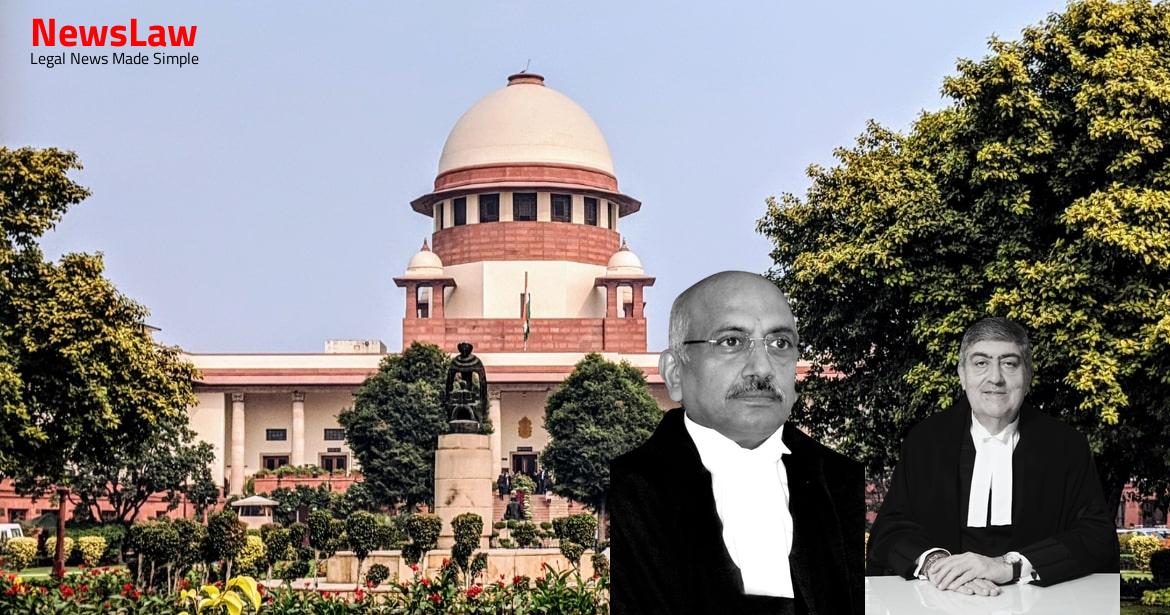In a landmark decision, the Supreme Court of India has addressed the pension eligibility of Gramin Dak Sevaks in the postal department. This case, which had its roots in a previous High Court directive and Tribunal’s order, has significant implications for the retirement benefits of these employees. Stay informed about the latest developments in this crucial legal battle. #LegalCase #SupremeCourt #PensionEligibility
Facts
- 1.1
- 1.2
- 1.3
- 1.4
- 1.5
- 1.6
- 1.7
- 1.8
- High Court directed compliance of Tribunal’s order based on earlier judgment of the Court in W.P. (C) No 11665 of 2011.
- High Courts uniformly ruled in favor of Gramin Dak Sevaks who were selected as regular employees of the postal department.
- Tribunal’s directive stated the period spent as Gramin Dak Sevak will be counted in toto for pension benefits for those absorbed as regular Group ‘D’ staff.
- Pension will be granted under CCS (Pension) Rules, 1972 for Gramin Dak Sevaks retiring without absorption as regular Group ‘D’ staff with a period counting condition of 5/8 of the total service tenure.
- In all appeals, the respondents’ service tenures in regular posts were slightly less than the 10-year requirement for pension eligibility.
Also Read: VVF India Ltd. vs. Employee Union: Wage Revisions & Benefits Case
Arguments
- Appellants argue that Gramin Dak Sevaks are regulated by different rules and a new service rule should not be created for them.
- Citing Superintendent of Post Offices and Others v. P.K. Rajamma, it was established that Extra-Departmental Agents associated with postal departments have a unique service structure.
- Specific timeline and service details of a particular case (SLP No. 6544 of 2019) were provided.
- Appellants challenge the decision of the Orissa High Court regarding the equivalence of service between Gramin Dak Sevak and regular service.
- It is noted that a Gramin Dak Sevak is allowed to pursue other vocations simultaneously.
- The working hours of a Gramin Dak Sevak are comparatively lower (3-5 hours).
Analysis
- The case deals with the computation of service for pension eligibility of employees who served as Gramin Dak Sevaks (GDS) in the postal department.
- The 2011 Rules stipulate that GDS shall not be entitled to pension but to ex-gratia gratuity as decided by the Government, which was struck down as unconstitutional by the Central Administrative Tribunal.
- The service period of GDS cannot be combined with regular tenure for pension eligibility as they are part-time employees with different employment characteristics.
- There is no specific provision for computing GDS service to meet pension service requirement.
- The court emphasizes that GDS service cannot be artificially extended for pension benefits without a legal basis.
- The minimum service period required for pension eligibility in the postal department is 10 years.
- Challenges in pension eligibility due to marginal shortfall in regular service tenure are highlighted.
- The Rules governing GDS service do not allow for pension entitlement, and there is ongoing legal dispute regarding this issue.
- The judgment under appeal is deemed unsustainable in the context of eligibility for pension benefits.
- The need for appointment of GDS requires concurrence from the Department of Pension & Pensioner’s Welfare.
- The significance of the 1991 circular in the case is mentioned, which was considered in a previous case involving pension entitlement.
- The issue before the Court pertained to the eligibility of GDS to become a member of Nagar Panchayat.
- The Court opined that GDSs were government servants holding civil posts.
- The Constitution Bench judgment in D.S. Nakara & Ors. vs Union of India [(1983) 1 SCC 305] was cited regarding pensioners’ discrimination.
- The Court found no legal principle to include GDS service tenure in regular service for pension calculation.
- A case of a GDS seeking pension benefits was brought up where temporary service was counted as qualifying, excluding work-charged establishment period.
- The Court highlighted a Rule allowing service of more than 3 months in a fraction of a year to be considered as a full year for pension benefits calculation.
- A Full Bench of Punjab and Haryana High Court had struck down a similar Rule.
- The Court noted that a previous judgment allowing work-charged employee service to be counted for pension benefits was rejected in another case.
- Rulings on calculation of qualifying service in regular employment were discussed under Rule 49(3) of the 1972 Rules.
- The Court referred to a case where claims of work-charged employees in a different department were considered for pension benefits.
- The distinction between government servants and full-time casual employees like Extra Departmental Agents was highlighted in a separate case.
- A case involving a work-charged employee in Uttarakhand seeking pension benefits based on service in that capacity was also mentioned.
- The decisions in the cases of P.K. Rajamma and Chet Ram are relied upon for establishing that the respondents were government servants as GDS or civil posts.
- The judgement in Habib Khan’s case cannot be applied to support the respondents’ plea due to the clear findings in the aforementioned cases.
- An unreported judgement of Karnataka High Court in Union of India and Others Vs. Dattappa favored counting the service period as extra-departmental Agent for pension qualification.
- The Karnataka High Court’s Division Bench considered the employment to be continuous and not a switch from one service to another.
- Ministry or Department can relax or dispense with the rules if undue hardship is caused in a particular case.
- Any relaxation or dispensation must be reasoned and recorded in writing.
- The extent, exceptions, and conditions of the relaxation must be determined by the Ministry or Department.
- No order for relaxation shall be made if it contravenes any statutory provision.
- Undue hardship to a large number of employees must be considered in cases of relaxation of rules.
- Resorting to Rule 88 should not be avoided just because it might prolong the process.
- The authorities should evaluate cases for relaxing the mandatory qualifying service requirement under the 1972 Rules if conditions in Rule 88 are met.
- The court directs following the course as directed in the case of Union of India & Ors. v. Registrar & Anr.
Also Read: Legal Analysis of M/S Rajco Steel Enterprises v. Kavita Saraff: The Dynamics of Dishonoured Cheques
Decision
- The Orissa High Court upheld the Tribunal’s order in the writ petition by Union of India and postal authorities.
- Existing pension orders for any respondents should not be disturbed.
- For respondents without pension orders, the concerned ministry can consider relaxing the minimum qualifying service rule.
- Interim orders in these appeals have been set aside with the specified conditions.
Case Title: UOI Vs. GANDIBA BEHERA
Case Number: C.A. No.-008497-008497 / 2019



